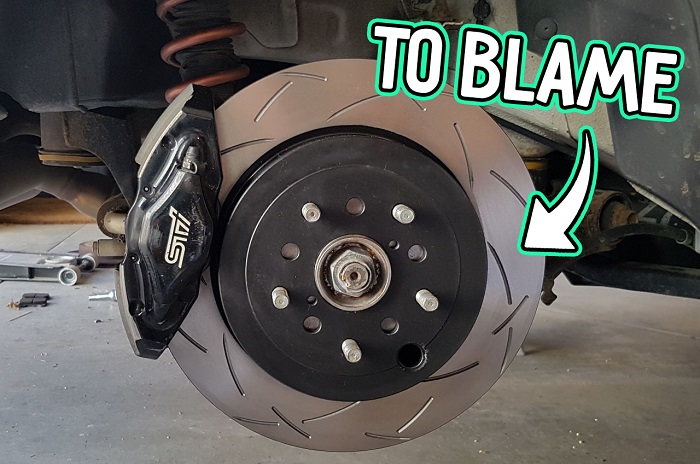
Automakers spend an exorbitant amount of money to achieve a safety standard that complies with thousands of different laws. This makes cars extremely safe, but if your car is shaking while braking at high speeds or downhill, these safety norm requirements are at risk, and you should fix your car as soon as possible.
Here are the common reasons why your car shakes while braking:
- Unbalanced tires
- Brake rotors are out of round
- Brake caliper issues
- Suspension issues
- Wheel mechanism issues
- Axle issues
- Dry guide pins
- Worn out brake pads
- Damaged rim
- Alignment issues
- Loose or broken hoses
- Engine issues
- Power steering issues
Unbalanced Tires
If your car shakes while driving at higher speeds or slowing down from higher speeds, chances are that your tires are unbalanced. This happens regularly with older tires that need readjustment or even complete replacement. This is one of the most common reasons why cars tend to shake while braking which can sometimes even be solved simply by balancing the air pressures across all four tires.
Brake Rotors Are Out Of Round
Out-of-round or warped brake rotors are a dead giveaway that your brake rotors are due for a complete replacement. Warped brake rotors are commonly caused by cooking the rotors too much which is common with tuned cars with factory brake rotors. However, issues such as these are mostly felt while braking downhill because by doing so you are exerting more force onto your rotors thus increasing the temperature which causes warping.
Brake Caliper Issues
Brake calipers are also designed to last a certain amount of time, which means that you ought to replace them every 70-130k miles on average. Whenever you sense constant wheel shaking which increases when you press the brakes, your calipers are likely the culprit. Sometimes the brake calipers can even stick to the rotors and the easiest way to tell is if the shakiness is accompanied by a strong smell. Either way, be sure to park the car up whenever you sense any problems with your brakes as they are an essential aspect of car safety.
Suspension Issues
The entire suspension system is comprised out of several different components that all have to work in unison. However, as you drive your car and you start accumulating the miles, these components slowly go out of place, and they often cause shaking while braking because braking enhances these discrepancies. This means that you should inspect your suspension, but only after you inspect your wheels, brakes, and tires because they are usually the ones causing the shakiness.
Wheel Mechanism Issues
The most common wheel mechanism issues are due to a faulty wheel bearing or a faulty steering rack. In addition to shaking while slowing down, you may also encounter strange noises coming from the front of your vehicle. If this is the case, your wheel mechanism is likely to be causing it. As such, be sure to test your steering system in a safe environment away from traffic, and if you sense that your steering is acting up, be sure to park the car up and call for assistance.
Axle Issues
If your axles are bent or arched in any way, you will feel shaking while slowing the car down. This usually happens to cars that are often being driven on unpaved roads or roads with many aggressive potholes. These issues usually lead to damaged CV joints which are tasked with transferring power between different components with minimal energy waste.
Dry Guide Pins
A fairly uncommon culprit, but a culprit nevertheless, a dirty guide pin can cause shaking if extremely dirty or dry. These caliper components can be easily taken off and cleaned if necessary, so if your pins are dirty, be sure to clean them up. This is obviously an easy fix, but one that should not be ignored because issues such as these can cause more problems down the line if not dealt with swiftly and efficiently.
Worn Out Brake Pads
Probably one of the most common issues that cause shaking while braking is a worn-out brake pad. Whenever your pads are less than 25% of their original size, it's time for an overdue replacement which usually solves the issue. It’s best to take your car to a dealership or an independent mechanic in order to replace the pads according to your manufacturer's recommendations.
Damaged Rim
Another fairly surprising, yet common issue with city-driven cars is a bent rim. This usually happens due to unpaved roads or roads with aggressive potholes and it results in the car shaking at a certain side. This shaking is usually increased while braking. You can inspect your car yourself simply by taking a look at all four of your wheels, but to do so properly, it's best to raise your car on a jack stand.
Alignment Issues
Alignment issues are known to cause the car to shake while braking at speeds above 50mph. A great way to test if your car has any alignment issues is to find an empty stretch of road and try to remove your hands from the steering wheel while traveling at around 50mph. Be sure to keep your hands inches away from the steering wheel because you only want to test out if the car tries to move to either side. If the car tries to swerve left or right, chances are that you having alignment issues.
Loose Or Broken Hoses
Engines are connected with various parts by all sorts of hoses which are intended to expel fumes from the engine that release combustion pressure. As such, if some of these hoses are damaged or loose, they can leak which tends to lead to engine shaking even while the vehicle is only idling. However, these can often increase in intensity while braking or accelerating depending on the function such hoses carry.
Engine Issues
The engine needs consistent fuel to air ratio to function properly which means if any of these are out of shape, they can cause all sorts of shakiness and vibrations. These are commonly felt while accelerating but they can also be felt while decelerating. Either way, this issue can easily be fixed by simply replacing the engine air filter. Be that as it may, an engine is an intricate piece of machinery so be sure not to drive the car until everything is sorted out.
Power Steering Issues
If you sense the car is shaking while making a turn, it can often lead to problems with the power steering. These are commonly caused by leaks from the power steering pump which means that you will have to inspect the pump in order to properly pinpoint the issue. Issues such as these can usually be felt while steering, but if they increase while braking, it often means that you have a problem with the power steering.
FAQ Section
How Much Does A New Brake Pad Cost?
On average, new brake pads cost around $150 per axle, but these usually vary from $100 per axle, up to $300 per axle depending on the car in question. A complete brake overhaul which consists out of replacing both the pads and the calipers usually costs between $500-$800, but these prices can also vary depending on the car in question and labor costs.
Should I Replace My Brake Pads All At Once?
It’s not necessary to replace all four brake pads at once, but it is necessary to replace both the front ones at the same time. If you only replace a single brake pad at either the front or the back, your brakes will become unbalanced which can even cause your car to swerve to one side while braking. This will also cause uneven wear between the pads which can even be extremely dangerous.
Are All Car Brakes The Same?
No, they are not. Some brakes are larger and are gripped with more pistons per caliper to slow the car faster. The best brakes out there are built out of carbon-ceramic brake fade-resistant materials. Most performance cars also use rotors with holes in them which also makes them more resistant to brake fade due to increased operating temperatures.
Is Car Shaking While Braking Dangerous?
As there are many potential reasons why this is happening, it's best to not drive the car before these issues are properly diagnosed. Even if you do pinpoint a possible cause of the shakiness it does not mean that the issue you encountered is the sole perpetrator. As such, park the car up and don’t drive it before you are certain that there aren’t any more serious issues at hand.
How Long Do Brake Pads Last?
On average, brake pads should last you at least 10k miles, but some of them can last 100k miles or even more. You can even extend the lifespan of your brake pads by simply increasing the following distance to the car in front which means usually gives you more time to slow down which means that your pads will work significantly less.
About the authors
The CarAraC research team is composed of seasoned auto mechanics and automotive industry professionals, including individuals with advanced degrees and certifications in their field. Our team members boast prestigious credentials, reflecting their extensive knowledge and skills. These qualifications include: IMI: Institute of the Motor Industry, ASE-Certified Master Automobile Technicians; Coventry University, Graduate of MA in Automotive Journalism; Politecnico di Torino, Italy, MS Automotive Engineering; Ss. Cyril and Methodius University in Skopje, Mechanical University in Skopje; TOC Automotive College; DHA Suffa University, Department of Mechanical Engineering






Add comment